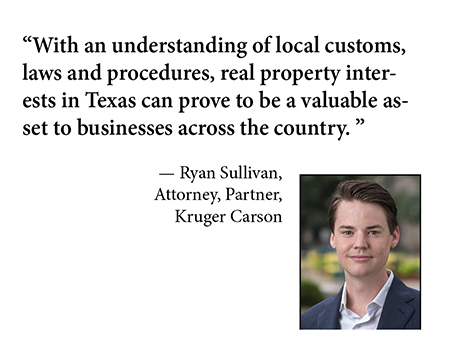[ad_1]

By Ryan Sullivan, partner, attorney, Kruger Carson PLLC
In recent years, a record number of businesses have moved to Texas to take advantage of the strong economy, including the red-hot real estate market.
Whether a party wants to buy or lease real estate, they need to be aware of certain rules and regulations that make Texas real estate transactions different from other parts of the country. Below is a high-level survey of some of these issues.
Special considerations
Buyers of real estate in Texas will want to make sure their sales contracts contain non-refundable down payment clauses even if they end within their “free look” period. Otherwise, Texas courts have ruled that sales contracts are unenforceable against consumers until some portion of the proceeds can be returned.
Fraudulent Marketing Practices
The Deceptive Trade Practices/Consumer Protection Act (DTPA) is intended to protect consumers from deceptive business practices or unfair trade practices. The DTPA does not apply to many commercial transactions, but because of the high risk of liability, a well-drafted disclaimer should be included in most sales and lease agreements as a good practice.
Closing Prices
In Texas, title insurance rates are published by the Texas Department of Insurance, so title companies cannot compete on price.
Although the distribution of closing costs can be negotiated between the buyer and seller, it is customary for the buyer to pay the original amount for the buyer’s policy and the buyer to pay for additional coverage. . There are currently no deed transfer taxes, mortgage taxes, or rental taxes payable on transfers of Texas real estate.
Texas Agreement
In addition to setting rates for title insurance, the Texas Department of Insurance publishes several warranty standards used in Texas. Texas supports not only naming the versions of their counterparts “ALTA” and “CLTA” found elsewhere in the country. As a result, caution should be used to ensure that the customer understands the information provided by the support.
Special Disclosure Agreement
The type of ticket used for commercial transactions is a special warranty ticket. A Texas special warrant is most likely to be recognized by a designated ad that a person withholds their social security number or driver’s license number before writing it.
Most importantly, Texas law requires carefully written language for a tenant to make a claim for property damage that occurred before foreclosure. Additionally, the seller may want to include “AS-IS” language in the deed, but current case law indicates that this may override some of the covenants and issues of the work called before most of the tickets.
Mineral Power
When real estate is sold in Texas, the mineral land is separated from the real estate. Special care is required because it is a matter of Texas common law that the mineral estate is considered the dominant interest in the land.
As a result, the land owner must participate in certain uses of the mineral land owner. This has different effects in different areas of Texas (especially during years of fracking), depending on factors such as the types of oil, gas and minerals found in the area and regional restrictions. for extraction or excavation.
Taxes
Although Texas has no income tax, property owners pay ad valorem property taxes. In addition to traditional ad valorem taxes, property in Texas outside of city limits may be subject to municipal utility districts or other public authorities that have the right to determine the assessments.
Buyers in these areas are required to provide specific information to buyers or face liability for the purchase. Finally, certain entities above a certain income threshold are subject to the “Texas Income Tax,” which is essentially a flat income tax with a maximum rate of 0.7 percent of income. Landlords and tenants of triple-net leases negotiate whether the tenants must pay a portion of those taxes.
Finally, Texas buyers should be aware that if they purchase real property subject to certain tax exemptions, any development or other activity may result in the loss of the tax exemption and result in a non-carry-forward tax liability. only, but for the previous three years. the buyer takes title.
Expulsions
Texas has a very favorable environment that provides many remedies for landlords and tenants who fail to meet their obligations under a commercial lease. Texas landlords have the legal right to foreclose on a commercial tenant who fails to pay rent on time without first going to court in many cases. In addition, in most cases, landlords can file a foreclosure action on just three days’ notice to evict a commercial tenant.
Closures
Lenders establish rights to their liens through a number of ways in Texas, but the most common and important for real estate transactions is through a deed of trust issued by the borrower.
Deeds of trust allow lenders to pursue not only legal foreclosures but also illegal foreclosures. In a foreclosure, or “right of sale,” the lender can put the property up for sale to pay off the loan without filing a lawsuit or getting a court order. .
Just like Texas itself, real estate prices in this state are different than anywhere else in the country. However, by understanding the local customs, laws and regulations, real estate interests in Texas can prove to be a valuable asset to businesses across the country.
— Ryan Sullivan is an attorney and associate Kruger Carson PLLC in Austin and San Antonio. His real estate experience ranges from buying and selling to leasing and financing.
[ad_2]
Source link
